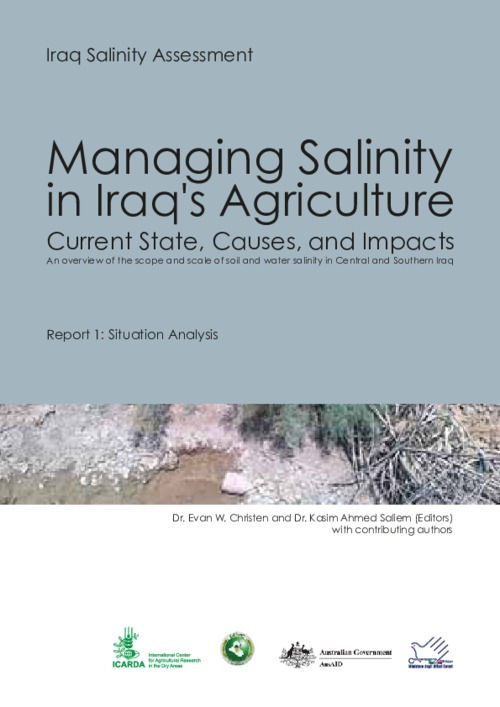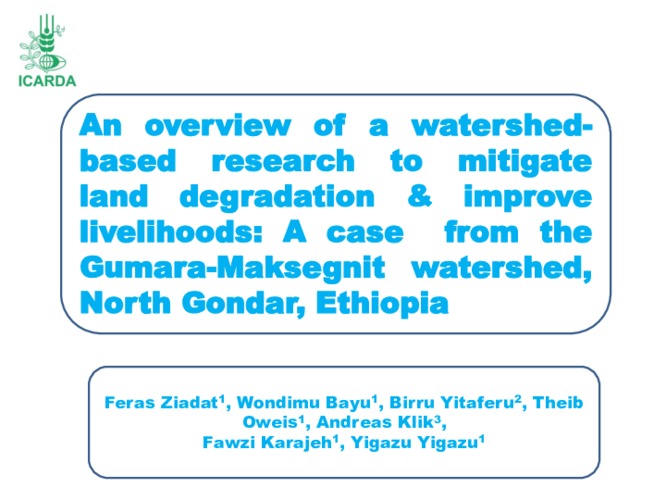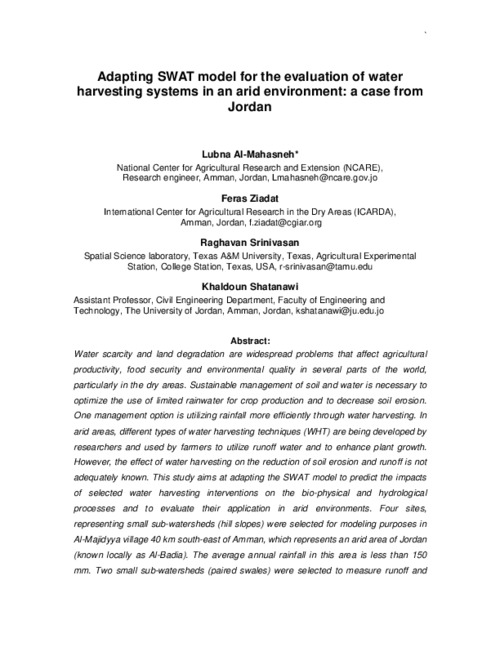Location
The International Center for Agricultural Research in the Dry Areas (ICARDA) was established in 1977. It is one of 15 such centers supported by the CGIAR. ICARDA’s founding mandate to promote agricultural development in the dry areas of developing countries remains highly relevant today.
ICARDA works with a tight focus on the problem-solving needs of resource-poor farmers, achieving this through the in-field delivery of its research outputs. Although global food production has increased by 20 per cent in the past decade, food insecurity and poverty remain widespread, while the natural resource base continues to decline.
International research centers such as ICARDA, which have helped drive previous improvements, continue to deliver new technologies to support sustainable growth in agriculture, and crucially, to work with a wide range of partners to accelerate the dissemination of these technologies.
ICARDA’s biggest strength is its staff – 600 highly skilled men and women from 32 countries. Our research and training activities cover crop improvement, water and land management, integrated crop-livestock-rangeland management, and climate change adaptation.
Other interventions include:
- Water harvesting - supplemental irrigation and water-saving irrigation techniques
- Conservation agriculture methods to reduce production costs and improve sustainability
- Diversification of production systems to high-value crops – horticulture, herbal and medicinal plants
- Integrated crop/rangeland/livestock production systems including non-traditional sources of livestock feed
- Empowerment of rural women – support and training for value-added products.
The ICARDA genebank holds over 135,000 accessions from over 110 countries: traditional varieties, improved germplasm, and a unique set of wild crop relatives. These include wheat, barley, oats and other cereals; food legumes such as faba bean, chickpea, lentil and field pea; forage crops, rangeland plants, and wild relatives of each of these species.
ICARDA’s research portfolio is part of a long-term strategic plan covering 2007 to 2016, focused on improving productivity, incomes and livelihoods among resource-poor households.
The strategy combines continuity with change – addressing current problems while expanding the focus to emerging challenges such as climate change and desertification.
We work closely with national agricultural research systems and government ministries. Over the years the Center has built a network of strong partnerships with national, regional and international institutions, universities, non-governmental organizations and ministries in the developing world and in industrialized countries with advanced research institutes.
THE ‘DRY AREAS’
Research and training activities cover the non-tropical dry areas globally, using West Asia, North Africa, Central Asia and the Caucasus as research platforms to develop, test, and scale-out new innovations and policy options.
Dry areas cover 41 per cent of the world’s land area and are home to one-third of the global population. About 16 per cent of this population lives in chronic poverty, particularly in marginal rainfed areas. The dry areas are challenged by rapid population growth, frequent droughts, high climatic variability, land degradation and desertification, and widespread poverty. The complex of relationships between these challenges has created a "Poverty Trap."
Members:
Resources
Displaying 321 - 325 of 431Managing Salinity in Iraq's Agriculture: Current State, Causes, and Impacts
This report is the first in a series of publications that comprise the Iraq Salinity Assessment.
This report documents the current state, causes, impacts of salinity in central and southern
Iraq. Other reports in the Assessment propose solutions and investment options to
manage and remediate salinity in Iraq.
The Iraq Salinity Assessment synthesizes the results or the Iraq Salinity Project, a research
partnership between five Iraqi ministries and national agencies and an international team
An overview of a watershedbased research to mitigate land degradation & improve livelihoods: A case from the Gumara-Maksegnit watershed, North Gondar, Ethiopia
Ethiopia has great agricultural potential as it has vast area of fertile land, diverse climate, sufficient annual rainfall, & abundant labor force. However, the current performance of agric. is far below the potential, partly due to soil erosion & land degradation, lack of using improved technologies, lack of supportive services, poor socioeconomic infrastructure, & many more interrelated socioeconomic factors. Consequently, food insecurity & poverty have remained common features in the rural community.
Adapting SWAT model for the evaluation of water harvesting systems in an arid environment: a case from Jordan
Water scarcity and land degradation are widespread problems that affect agricultural productivity, food security and environmental quality in several parts of the world, particularly in the dry areas. Sustainable management of soil and water is necessary to optimize the use of limited rainwater for crop production and to decrease soil erosion. One management option is utilizing rainfall more efficiently through water harvesting. In arid areas, different types of water harvesting techniques (WHT) are being developed by
WLI Newsletter: April Issue
The goal of WLI is to improve the livelihoods of rural
households and communities in areas where water
scarcity, land degradation, water quality deterioration,
food security and health problems are prevalent in eight
participating countries including Egypt, Iraq, Jordan,
Lebanon, Palestine, Syria, Tunisia, and Yemen. The main
objective is to develop and pilot test integrated water and
land management strategies.
A new approach for mapping and assessing degraded lands (Tunisia)
This summary describes the work of the LADA (Land Degradation and Assessment in Dry Areas) project that identifies and describes geographical areas suffering from land degradation in the governorates of Tunisia. Through a comparative study of these areas, it identifies the failures and successes in national efforts to combat land degradation and, therefore, build local community capacity to resist climate change. It is intended for policymakers, donors and other partners and supporters.







